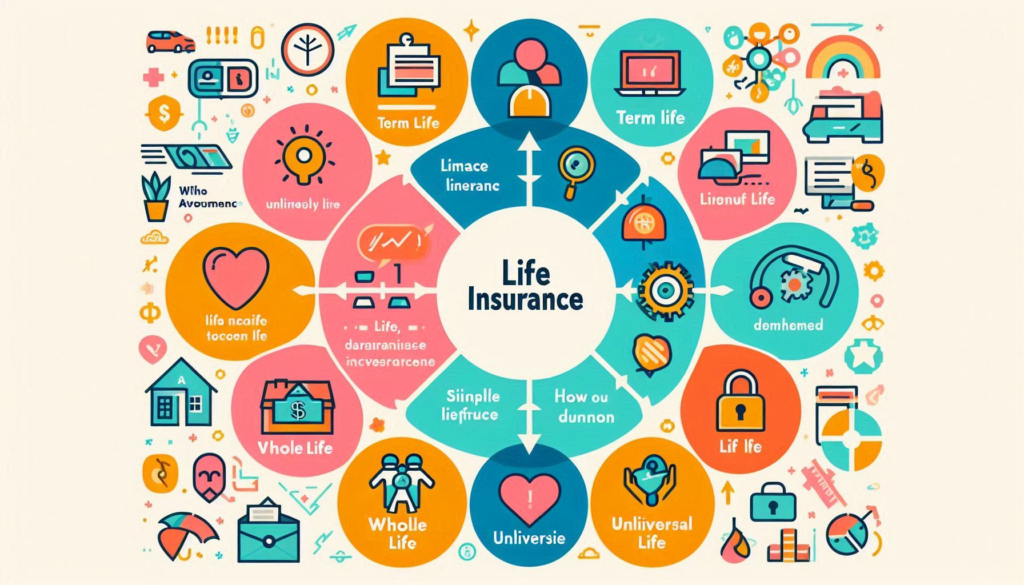Life insurance is a critical financial tool that offers security to your loved ones when you’re no longer there to provide for them. In simple terms, it’s a contract between you and an insurance company. You pay premiums, and in exchange, the company pays a death benefit to your beneficiaries after your passing. But how does life insurance work exactly, and why is it such an essential part of financial planning?
How Does Life Insurance Work?
Life insurance functions on a simple principle: protecting your family from financial burdens. When you take out a policy, you’re agreeing to pay a set amount, either monthly or annually, known as a premium. In return, the insurer promises to pay a lump sum, called a death benefit, to your designated beneficiaries when you die.

Types of Life Insurance
There are several types of life insurance, each catering to different needs and financial goals.
| Type | Description |
|---|---|
| Term Life Insurance | Coverage for a specific period (e.g., 10, 20, or 30 years); typically more affordable. |
| Whole Life Insurance | Provides lifetime coverage and includes a cash value component that grows over time. |
| Universal Life Insurance | Offers flexibility in premiums and death benefits, with a savings element. |
Term Life Insurance
Term life insurance is one of the simplest and most affordable options. It provides coverage for a fixed term, usually 10, 20, or 30 years. If you die within this period, your beneficiaries receive the death benefit. However, if the term expires and you’re still alive, the coverage ends without a payout.
Whole Life Insurance
Whole life insurance, on the other hand, covers you for your entire life as long as premiums are paid. It’s more expensive but comes with an added benefit—a cash value component that grows over time. This can be borrowed against or even withdrawn.
Why Do You Need Life Insurance?
The question often arises: why is life insurance necessary? The answer lies in its purpose—financial protection. Life insurance provides peace of mind, knowing that your loved ones will have financial support even after you’re gone.
Financial Security for Loved Ones
The primary reason to purchase life insurance is to provide for your family. The death benefit can cover immediate expenses, such as funeral costs, and long-term financial needs like paying off debts, mortgages, or funding education.
“The greatest gift you can leave behind is financial security for those you love.”
Income Replacement
If you are the primary breadwinner, life insurance ensures that your income is replaced in the event of your untimely death. This replacement income can help your family maintain their standard of living, cover daily expenses, and secure their future.

Life Insurance and Estate Planning
Life insurance can also play a pivotal role in estate planning. The death benefit can help pay estate taxes, ensuring that your heirs receive the full value of your assets. It can also be used to equalize inheritances among beneficiaries.
Tax Benefits of Life Insurance
One of the attractive features of life insurance is the tax-free nature of the death benefit. In most cases, your beneficiaries won’t have to pay taxes on the money they receive, providing them with maximum financial benefit.
| Tax Benefits of Life Insurance | Explanation |
|---|---|
| Tax-Free Death Benefit | Beneficiaries receive the payout without paying income tax. |
| Tax-Deferred Cash Value Growth | Whole and universal life policies offer tax-deferred savings. |
Common Myths About Life Insurance
Despite its importance, there are several misconceptions about life insurance. Let’s address a few of them:
- “I’m too young to need life insurance.” Young people often think life insurance is for older adults. However, buying a policy when you’re young and healthy ensures lower premiums.
- “Life insurance is too expensive.” Many people overestimate the cost of life insurance. Term life insurance, in particular, is quite affordable and can fit into most budgets.
- “I don’t need life insurance if I’m single.” Even if you’re single, life insurance can help cover your debts, funeral expenses, and leave a legacy to your loved ones or favorite charities.
“Life insurance is not for those who die; it’s for those who live.”
Conclusion: Protect Your Loved Ones with Life Insurance
Life insurance is a crucial part of financial planning. It not only offers financial protection for your loved ones but also serves as an income replacement, helps with estate planning, and provides tax benefits. Regardless of your age or stage in life, having a life insurance policy ensures peace of mind knowing that your family’s future is secure.
“You don’t buy life insurance because you’re going to die, but because those you love are going to live.”
By understanding how life insurance works and the benefits it offers, you can make an informed decision to secure your family’s financial future. Don’t wait for tomorrow; start planning today!
FAQ’S
What is life insurance?
Life insurance is a contract between you and an insurance company where you pay premiums, and in return, the company provides a death benefit to your beneficiaries upon your passing. It is designed to provide financial support to your loved ones in case of your death.
What are the different types of life insurance?
There are several types of life insurance, including:
- Term Life Insurance: Covers you for a specific term (10, 20, or 30 years) and is usually more affordable.
- Whole Life Insurance: Provides lifetime coverage with a cash value that grows over time.
- Universal Life Insurance: Offers flexible premiums and death benefits, and includes a savings element.
Why do I need life insurance?
Life insurance provides financial protection for your family after your death. It can help cover expenses like funeral costs, outstanding debts, mortgage payments, and ongoing living expenses, ensuring your loved ones are financially secure.
How much life insurance coverage do I need?
The amount of coverage you need depends on your financial situation, income, debts, and the needs of your beneficiaries. A common rule of thumb is to purchase coverage that is 5 to 10 times your annual income.
How much does life insurance cost?
The cost of life insurance depends on several factors, including your age, health, the type of policy, and the amount of coverage. Term life insurance is typically more affordable, while whole life policies tend to be more expensive due to their lifetime coverage and cash value component.
What happens if I outlive my term life insurance policy?
If you outlive a term life insurance policy, the coverage ends, and there is no payout. Some policies offer the option to renew or convert to a whole life policy before the term expires.
Is life insurance taxable?
In most cases, the death benefit from a life insurance policy is tax-free to your beneficiaries. However, if the payout is part of your estate, estate taxes may apply depending on the size of the estate.
Can I borrow money from my life insurance policy?
You can borrow money from the cash value of a whole life or universal life insurance policy. However, borrowing against your policy reduces the death benefit if the loan is not repaid.
What happens if I stop paying premiums?
If you stop paying premiums on a term life insurance policy, the coverage will lapse, and you will no longer be protected. For whole life policies, the policy may remain active for a time based on its cash value, but it could eventually lapse as well.


1 thought on “Life Insurance: How It Works and Why You Need It – iescobill.org.pk”